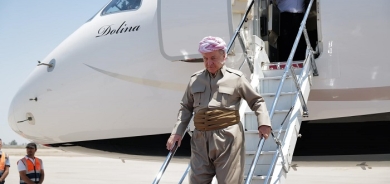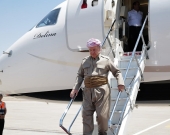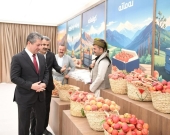Victories by Turkish-backed forces in Libya could alter balance of power in E.Med

"Turkey will exert significant influence in the North African country, enabling Ankara to project power across the eastern Mediterranean region and further challenge Israeli interests in the region, along with those of Israel's Egyptian, Cypriot, and Greek partners," a report by the Tel-Aviv based Institute for National Security Studies (INSS) said on Monday .
Turkish media reported this week that Ankara will establish two permanent military bases in Libya and intends to contribute to rebuilding efforts while beginning controversial oil and gas drilling activities in the country and off its coast in the next few months.
Yeni Şafak newspaper said on Friday that Turkey will use the al-Watiya air base, captured by GNA forces in May, as a drone hub, while establishing a second naval base in the city of Misrata, which would be crucial for a military supply line.
Turkey is backing the Tripoli-based GNA, led by Libyan Prime Minister Fayez al-Sarraj, in its fight against forces allied to rebel General Khalfia Haftar’s self-styled Libyan National Army, which is backed by Russia, the United Arab Emirates (UAE), and Egypt, among others.
Turkey stepped up its military support to the GNA in December 2019, sending drones and other military hardware to Libya, along with thousands of Syrian mercenaries, many of whom have links to Islamist militant groups.
The GNA has won a strong of major victories in the past month, and has now recaptured almost all the territories Haftar’s forces had previously taken in his bid to capture Tripoli, which he launched in April 2019.
Turkey’s military intervention came after Ankara signed a maritime demarcation deal with the GNA on Nov. 27, intended to give Turkey enhanced hydrocarbon drilling rights in the eastern Mediterranean.
The deal asserts that Turkey and Libya share a maritime border, ignoring the territorial waters around Cyprus and a number of Greek islands, including Crete. Greece, Cyprus and Egypt, which are seeking to build a pipeline carrying gas to Europe across those waters, have said the agreement is illegal.
Last month, the foreign ministries of Cyprus, Egypt, France, Greece, and the UAE signed a statement condemning Turkey for its "illegal activities" in the region. Israel did not sign up to the statement.
The INSS said that Israel's "silence" suggested that it was unsure over whether to actively engage in Libya at the risk of exacerbating an already tense relationship with Ankara.
The report said that Israel needed to prepare for Turkey and Russia both expanding their influence in the region and lamented "Washington's continued reluctance to assume a more active diplomatic or military role".
On Thursday, Turkish Foreign Minister Mevlüt Çavuşoğlu said the United States needed to play a bigger diplomatic and political role in Libya, TRT World reported.
"The United States needs to play a more active role, both for achieving a ceasefire and in the political process,” Çavuşoğlu said in an interview with broadcaster NTV.
While Washington has said it opposes Haftar's offensive and Russia’s support for his forces, it has not thrown its weight behind the GNA.
Çavuşoğlu’s statement came as Libya’s warring sides resumed United Nations-led talks this week to negotiate a ceasefire.
Çavuşoğlu, who dismissed a ceasefire proposal by Egypt as an attempt to save Haftar after losses on the battlefield, said on Thursday that only a lasting ceasefire under U.N. auspices would be acceptable.
Burhanettin Duran, a columnist for the pro-government Sabah newspaper and the head of Turkish pro-government think-tank SETA, said in a column on Friday that Russia is on its way to obtaining a permanent military base in Libya, which would be a threat to southern Europe and NATO.
“It is also unthinkable that Russia’s intervention in North Africa will only be limited to Libya,” Duran said, in what appeared to be a call for NATO and the West to support Turkey’s intervention in Libya.
“NATO members France and Greece, by supporting Hafter, are actually strengthening Russia's hand,” he added.
Although Duran’s article invoked a growing threat to NATO from Russia, Turkey has become closer to Moscow in recent years. Last year, Turkey purchased the Russian-made S-400 missile defence system in spite of protestations by NATO that it would threaten the security of its own defence systems.
Ahval















